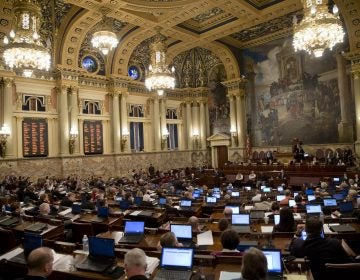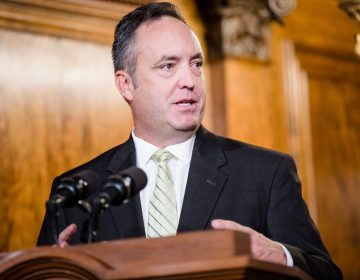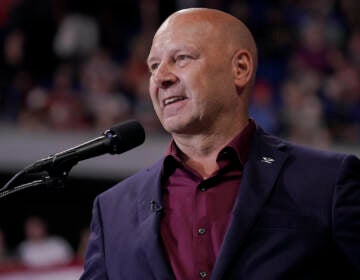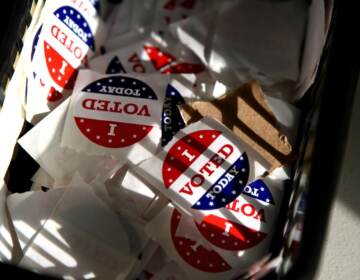Another lawmaker joins GOP field for Pennsylvania governor
A Republican state senator from southcentral Pennsylvania says he'll run for governor, adding to the GOP’s double-digits-deep primary field.

File photo: Senator Scott Martin (R-Lancaster) asks a question during a Senate Majority Policy Committee at the state Capitol in 2017. (Photo: Sen. Scott Martin)
A Republican state senator from southcentral Pennsylvania said Saturday that he will run for governor, adding to the GOP’s double-digits-deep primary field aiming to take on the presumed Democratic nominee, state Attorney General Josh Shapiro, in next year’s election.
Sen. Scott Martin, of Lancaster County, announced it in a video on his campaign website and Facebook page. He becomes the second Republican state senator in a field that is roughly a dozen deep and likely to grow.
Martin, 49, a former county commissioner, was first elected in 2016, and is the Senate’s Education Committee chair.
In his video messages, he leans heavily on his experience as a county commissioner — the challenges of balancing budgets and improving services — and working to become successful as a wrestler and football player in high school and college.
He also attacks what he says are holding Pennsylvanians back: government insiders, special interests, profit-hungry businesses, media, tech companies, health care costs and schools that “ignore parents and fail to meet the needs of kids year after year.”
“Getting Pennsylvania back on the right path means focusing on people and the things that make their lives better, not grandiose plans that sound good but never happen,” Martin said. “That’s why I’m running for governor.”
Martin is relatively unknown statewide. However, he has the advantage of being from a growing county that has the fourth-most registered Republicans in the state.
ov. Tom Wolf, a second-term Democrat, is constitutionally restricted from serving a third term. He has endorsed Shapiro, who is serving his second term as the state’s elected attorney general.
In the Senate, Martin has provided a reliable vote for Republican leadership on fiscal matters, pandemic-related legislation and hot-button issues like abortion, guns and elections.
The governor’s race, however, could turn on national issues.
Speaking with reporters Saturday, Martin hedged on questions about two issues that have been prominent with Republican primary voters: repealing mail-in voting and banning abortion.
Martin said there isn’t enough support in the Legislature to repeal the state’s expansive mail-in voting law that he supported in 2019. The law has lost favor with Republicans since former President Donald Trump began in early 2020 baselessly attacking mail-in voting as rife with fraud.
On abortion, Martin has backed Republican efforts to add restrictions, since vetoed by Wolf.
But those bills came before the U.S. Supreme Court’s conservative majority signaled that they would allow states to ban abortion much earlier in pregnancy and or even overturn the nationwide right that has existed for nearly 50 years.
Asked about it, Martin said he would sign “pro-life legislation,” but would not say exactly how far he might go toward restricting or banning the practice in Pennsylvania.
“It won’t be something that can be done by a governor alone, and you’d have to obviously work with the General Assembly and what we can get done in the General Assembly,” Martin said.
Martin enters the race at a time when advocates for taxpayer funding of private, parochial and charter schools are dominant forces in underwriting Republican campaigns.
As Education Committee chair, Martin introduced legislation opposed by school boards and teachers’ unions that seeks to make it easier to open charter schools and accelerate state taxpayer subsidies for private and parochial schools by hundreds of millions of dollars in the coming years.
Asked what he has done for public schools as Education Committee chair, Martin said he has worked with families during the pandemic on issues related to in-person instruction and masks, and “if the education that they were getting is in the best interest of their kids.”
He also, he said, believes “one size doesn’t fit all.”
Meanwhile, he has supported proposed constitutional amendments to require a two-thirds majority vote in the Legislature to increase taxes and to eliminate more than $14 billion in school property taxes.

Get daily updates from WHYY News!
WHYY is your source for fact-based, in-depth journalism and information. As a nonprofit organization, we rely on financial support from readers like you. Please give today.






